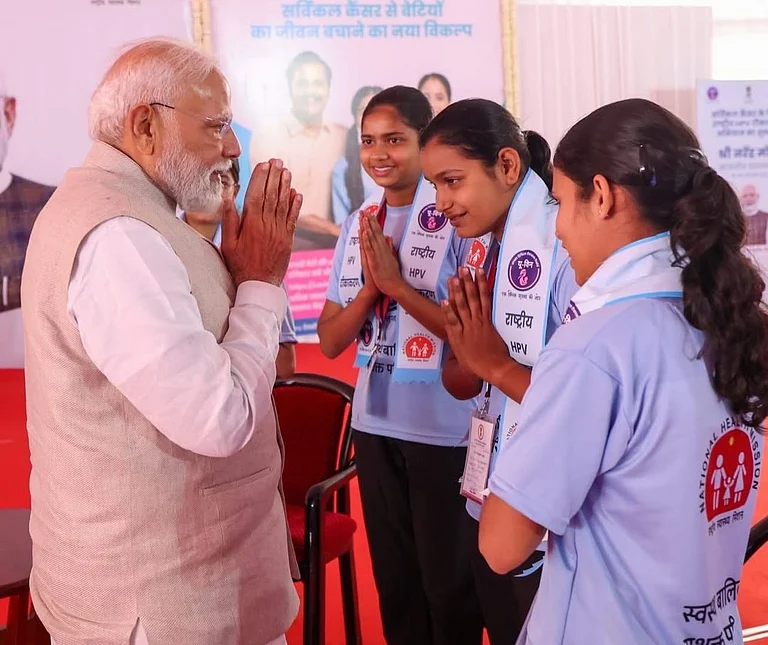The indigenously developed vaccine is affordable and will help curb the growing number of cervical cancer cases in India.
As the whole world gets used to the new normal after the pandemic, India is now ready to battle cervical cancer with its first indigenously developed quadrivalent Human Papilloma Virus (qHPV) vaccine to curb the growing number of cervical cancer cases among women in India.
The qHPV vaccine called CERVAVAC was launched on September 1 and will be manufactured by the Serum Institute of India (SII) along with the Government of India’s Department of Biotechnology. The Serum Institute of India (SII) received regulatory approval from the Drugs Controller General of India to manufacture the vaccine, earlier this year. The vaccine will be administered through injection in two doses for girls between 9 to 14 years of age and in three doses for those aged between 15 to 26 years of age.
Cervical Cancer: Why curbing it is essential?
Cervical cancer is a common sexually transmitted infection which occurs in the cells of the cervix that is the lower part of the uterus that connects to the vagina. Medical experts explain that the cervical lining alters, if an individual gets infected by Human Papillomavirus (HPV), which can lead to cancerous growth in the body. The virus being extremely contagious can spread among men and women through sexual contact.
According to WHO’s International Agency for Research and Cancer worldwide, Cervical cancer is the second most common cancer among women aged between 14 years to 44 years. In 2018, an estimated 570,000 women were diagnosed with cervical cancer, globally, of which 311,000 women died from the disease, according to the numbers shared by WHO.
India reports 1.23 lakh cases per year, which is 20 per cent of the total cases reported globally. Effective vaccination and required prevention approaches like screening and treating precancerous lesions will help prevent cervical cancer cases. If detected and managed early, cervical cancer is the most treatable form of cancer. Cases that are diagnosed at a later stage can be controlled with appropriate treatment and palliative care, explains WHO.
Cervical cancer is very common among women in developing countries, where women have limited or no access to public healthcare services. A structured approach will not only help prevent and treat cervical cancer but also ensure elimination of this health problem within a generation.
In May 2018, the Director General of the World Health Organization (WHO) announced a global call to action towards the elimination of cervical cancer and called for all stakeholders to unite towards achieving this common goal. In the successive year, the Executive Board requested the Director-General to outline a global strategy to accelerate the elimination of cervical cancer with clear targets from 2020 to 2030.
How will the new vaccine help Indian women?
The indigenously produced vaccine to fight cervical cancer has come at a time when India is witnessing a surge in the cervical cancer cases across the county. The introduction of Cervavac is in line with the global objective aimed at the elimination of cervical cancer as a public health problem.
As Cervavac will be manufactured in India, it will be easier to ensure that the preventive vaccine reaches to our female population, especially to those who do not have access to public healthcare services. Besides that, the ‘Made in India’ vaccine will be priced between Rs. 200 to Rs. 400, making it a cost-effective option compared to other vaccine currently available in the Indian market.
Currently, HPV vaccines available in India are being manufactured by foreign manufacturers and are priced between Rs. 2,000 to Rs. 3,500 per dose. According to NCBI, the two vaccines that are licensed globally and are available in India are Gardasil, marketed by Merck and Cervarix, marketed by Glaxo Smith Kline.
The two human papillomavirus (HPV) types, 16 and 18 are responsible for at least seventy percent of cervical cancers. According to Government of India’s Department of Biotechnology, Cervavac would be effective on HPV types 16 and 18 and also on types 6 and 11.
Adar Poonawalla, CEO of SII told Reuters, the vaccine would be out for sale in some months. The company first plans to roll out the vaccine for the Indian market and then will reach the global market. Then company aims to produce about 200 million doses in two years.


























